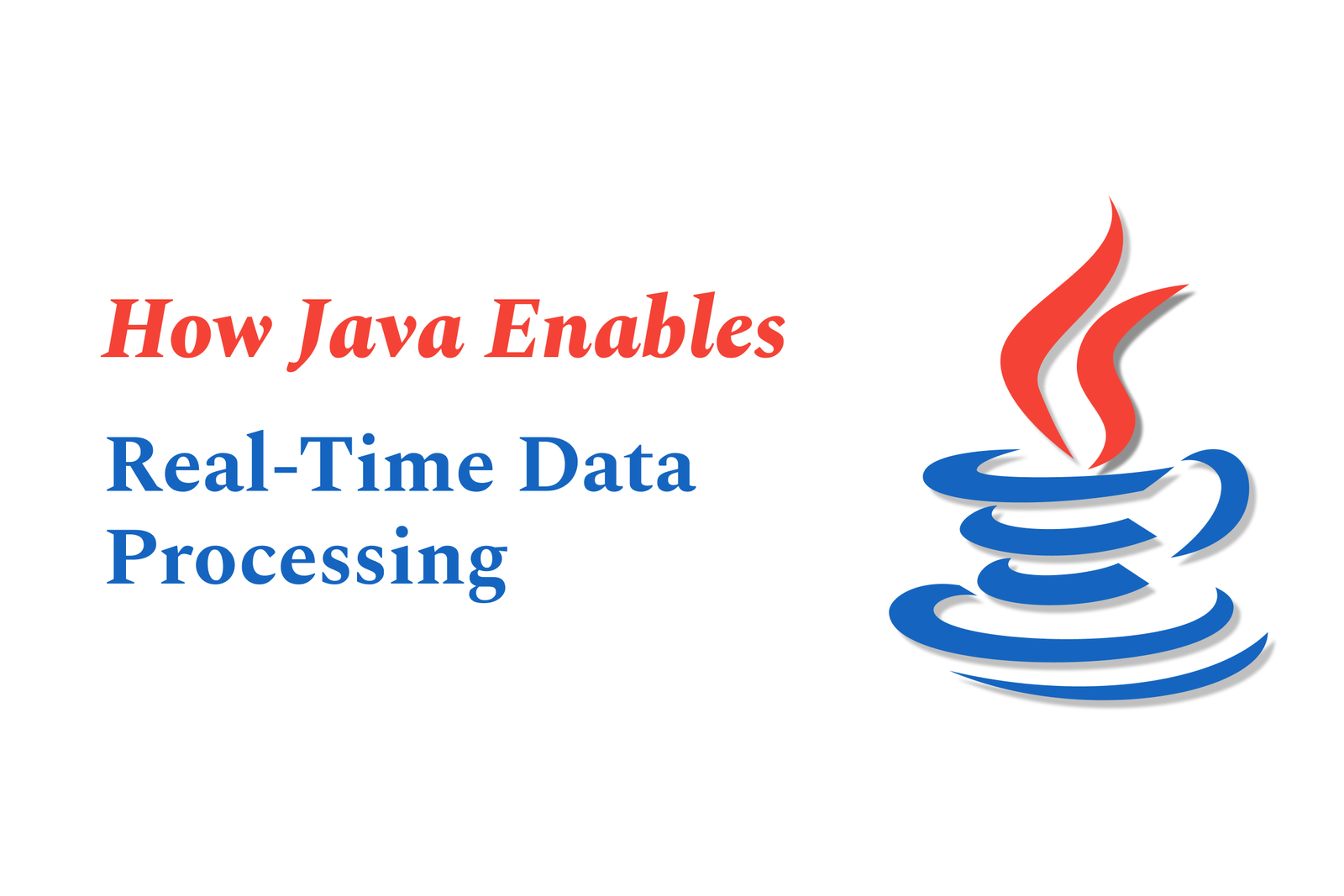How Java Enables Real-Time Data Processing
Java enables real-time data processing by providing robust, scalable frameworks like Apache Kafka and Flink, which handle high-throughput, low-latency streaming. Its platform independence, multithreading, and rich ecosystem allow efficient, fault-tolerant, and flexible data stream management.
How Java Enables Real Time Data Processing
1 ) Introduction to Real Time Data Processing
Real time data processing is critical for industries requiring immediate insights and actions based on live data streams, such as finance, healthcare, and e commerce. Traditional batch processing lacks the capability to deliver instantaneous results, making real time streaming essential.
2 ) Java's Role and Capabilities in Real Time Data Processing
Java has played a pivotal role in enabling real time data processing due to its robust ecosystem, scalability, and performance. Java based frameworks and tools support the ingestion, transformation, and analysis of streaming data with low latency and high throughput.
3 ) Key Technologies Leveraging Java for Streaming
Apache Kafka: Developed with significant Java components, Kafka facilitates the handling of high throughput, distributed data streams. Its architecture supports distributed commit logs and flexible data serialization methods such as JSON and Avro, which Java applications handle efficiently.
Apache Flink and Spark Streaming: Both provide Java APIs for building real time stream processing applications. They use Java's concurrency and scalability features to perform complex computations on streaming data with fault tolerance and exactly once semantics.
4 ) Java APIs and Frameworks for Stream Processing
Java offers comprehensive APIs, such as Kafka Streams and Flink DataStream, empowering developers to build complex event driven applications. Java's object oriented nature supports modular design, reusable components, and integration with other systems.
5 ) Advantages of Java in Real Time Systems
Platform Independence: Java's JVM allows deployment across diverse infrastructures from cloud to on premises.
Rich Ecosystem: Libraries and connectivity options streamline integration with databases, message brokers, and analytics tools.
Performance and Scalability: Optimized garbage collection and multithreading capabilities enable efficient handling of large scale real time workloads.
6 ) Challenges and Solutions in Java Real Time Processing
While Java introduces some complexity in managing memory and latency, newer JVM optimizations and tools help mitigate these issues. Furthermore, frameworks like Flink 2.0 enhance usability and reduce operational overhead, making real time Java applications more accessible.
7 ) Use Cases Enabled by Java Based Real Time Processing
Java powered pipelines are widely used in user facing dashboards, fraud detection, IoT data streams, personalized content delivery, and AI model serving, enabling businesses to react promptly and improve decision making.
In summary, Java's maturity, extensive framework support, and performance characteristics make it a cornerstone technology in building scalable, fault tolerant real time data processing systems that power modern applications and enterprises.
https://justacademy.in/news-detail/android-system-update-statistics
https://justacademy.in/news-detail/swiftui-for-mac-catalyst:-building-cross-device-apps
https://justacademy.in/news-detail/swift-concurrency-debugging-tools-in-xcode-16
https://justacademy.in/news-detail/java-and-docker:-containerization-best-practices
https://justacademy.in/news-detail/travel-&-hotel-apps-using-flutter
Related Posts
In 2025, top Angular libraries offer modern, feature-rich components and tools for building dynamic web apps. From powerful data grids to low-code platforms like UI Bakery, these libraries enhance development speed, UI design, and scalability, making them essential for Angular developers.
Migrating from AngularJS to Angular 17 involves gradually upgrading your app by running both frameworks together using tools like ngUpgrade, rewriting components in TypeScript, and adopting Angular’s modern architecture to enhance performance, maintainability, and long-term support.
Angular state management tools help organize and handle app data efficiently, improving scalability and maintainability. Popular options include NgRx for robust, RxJS-based patterns, and newer Signal Store solutions that offer simpler, reactive approaches integrated tightly with Angular’s latest features.
RxJS in Angular empowers developers to manage asynchronous data streams with powerful operators like `forkJoin`, `combineLatest`, and `zip`. Mastering these key operators in 2025 is essential for building efficient, reactive applications that handle complex event sequences seamlessly.
Angular performance optimization in 2025 focuses on improving app speed and responsiveness by using techniques like OnPush change detection, lazy loading, efficient data caching, and AOT compilation. These practices reduce load times, enhance user experience, and ensure scalable, fast Angular applications.
In 2025, Angular remains preferred for large-scale, enterprise apps with its robust, all-in-one framework, while Vue attracts developers seeking simplicity and fast development for smaller projects. Both frameworks excel, with choice driven by project needs and team expertise.
Angular Signals are a new reactive primitive in Angular 16 that enable fine-grained, efficient change detection by automatically tracking dependencies and updating only affected parts of the UI. They simplify state management and boost app performance, revolutionizing Angular's reactivity model.
Angular interview questions to prepare in 2025 focus on core concepts like components, directives, data binding, routing, and dependency injection, along with TypeScript mastery and latest Angular features to ensure strong practical knowledge for building scalable, efficient web applications.
AngularJS reached its official end of support in January 2022, meaning no further updates or security patches. To ensure app security and performance, developers should consider migrating to modern Angular versions or seek third-party long-term support options if immediate migration isn’t possible.
The Angular Roadmap 2025 highlights upcoming features focused on improving developer experience and performance, including zoneless Angular, Signals integration, enhanced Forms, async data handling, improved HMR, and expanded Angular Material/CDK enhancements, driving modern, efficient web app development.










